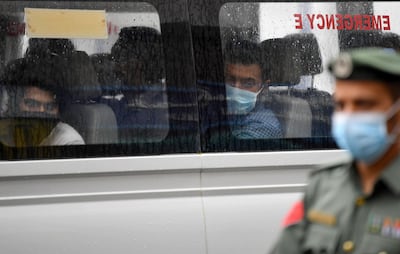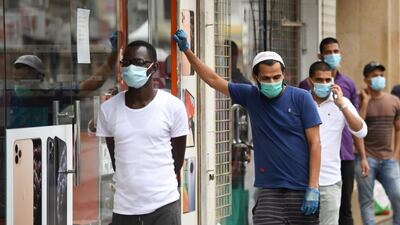The coronavirus pandemic has kept nearly half of all of humanity indoors, while essential workers continue to go outside to keep society on its feet. Among them are healthcare workers tending to patients. While medical staff have been praised for their life-saving efforts, the work of other professionals who are just as vital to our pandemic-struck societies has been overlooked.
Blue-collar workers, including labourers working on construction sites, grocery clerks, security and cleaning personnel, food delivery drivers and many more deserve a great deal of attention and care as the pandemic continues.
Their contributions to society and the economy are invaluable. In some countries, they are foreigners who seek better employment and income to care for their families, as is the case in parts of the Arab world. Here in the UAE, they are an integral part of our society. They have built Dubai’s world-famous skyscrapers, contributing in turning the city from a modest port in the vast Arabian desert into a glamourous, cosmopolitan financial hub. They have also constructed Abu Dhabi and Sharjah’s most iconic sites. Now that the pandemic has struck all sections of society and as we witness economic pressures around the world, these workers are also getting protection from its impacts. The UAE government has put in place important measures to try to shield the most vulnerable from this virus. Regardless of their nationality, people in need can apply for a stipend from the UAE government to support their families.
UAE-based charities are doing a spectacular job at helping low-income workers who have been laid off or whose salaries have been cut.

In addition to financial help, authorities have launched a mass-testing programme aimed specifically at low-income workers. In Ras Al Khaimah, authorities aim to carry out 20,000 tests on labourers by next month. In Abu Dhabi’s industrial district, 10,000 labourers are tested every day without charge. Food rations, water and juice are distributed to those waiting for hours in long queues. Those who test positive for the coronavirus are treated for free, and if other underlying conditions are discovered during the screenings, they are referred for treatment. In fact, anyone who contracts the virus in the UAE receives free treatment, and the government has also announced that it will look after the families of those who die from Covid-19, the disease caused by coronavirus, regardless of nationality or social status.
Other Gulf nations have taken similar action to support their most vulnerable workers. Labourer accommodation sites are being sterilised, and many of their occupants rehoused in larger accommodation units where they can more easily self-isolate. The UAE and Saudi Arabia provide free testing and treatment even for people who are residing in these countries without clear legal status.
Other residents of the UAE also have a role to play in providing relief and recognition to low-income workers. Thanking the cashier at one’s local supermarket or giving a hefty tip to food delivery drivers can go a long way in showing the most valuable and the most vulnerable workers that society is grateful for their work.
More than 8,000 UAE residents and citizens have thus far volunteered to help stop the pandemic and to provide relief for those who are quarantined or in need.
Proactive and preventative measures are crucial to keeping the most vulnerable members of society safe and healthy, and so is moral support and recognition from wider society. People who have contributed to the UAE’s success story deserve every possible support, both material and moral.


